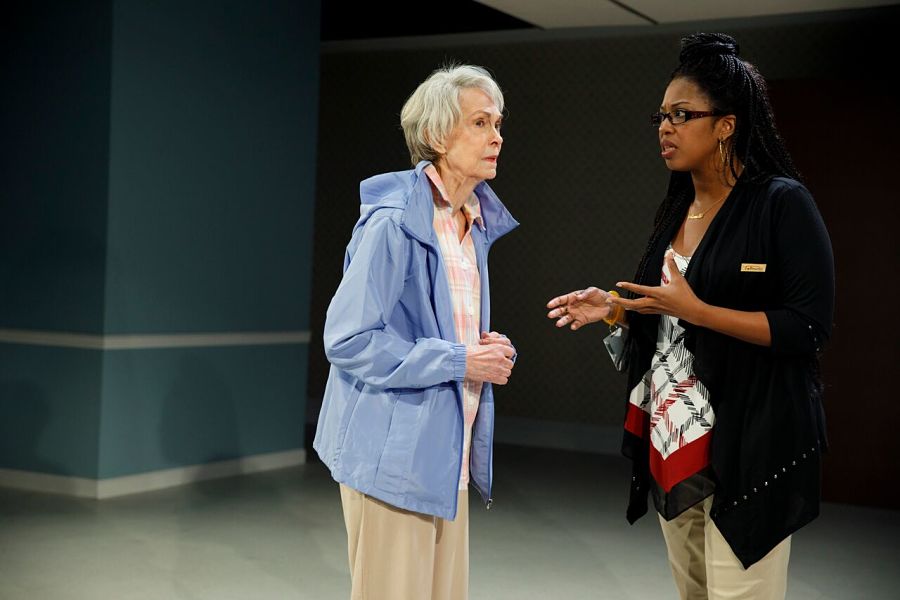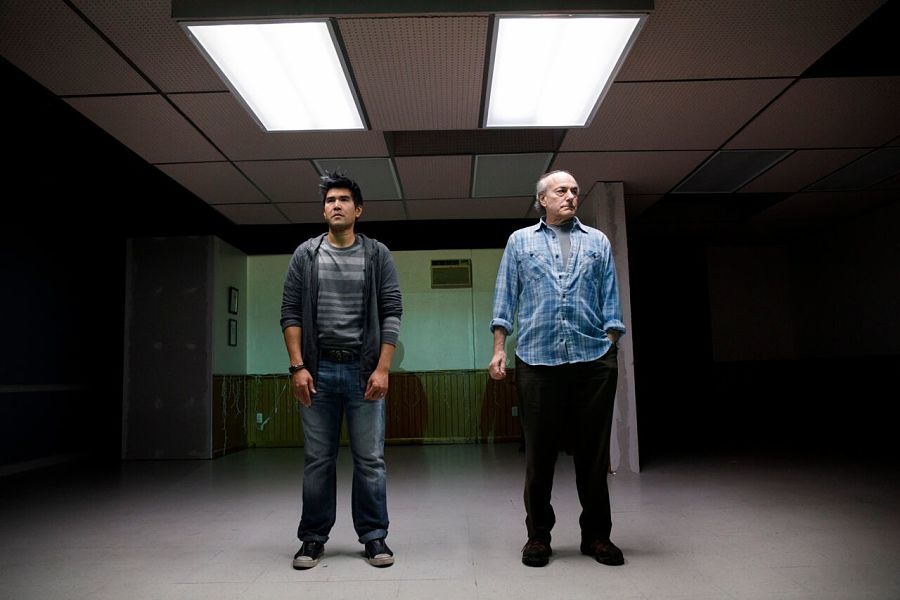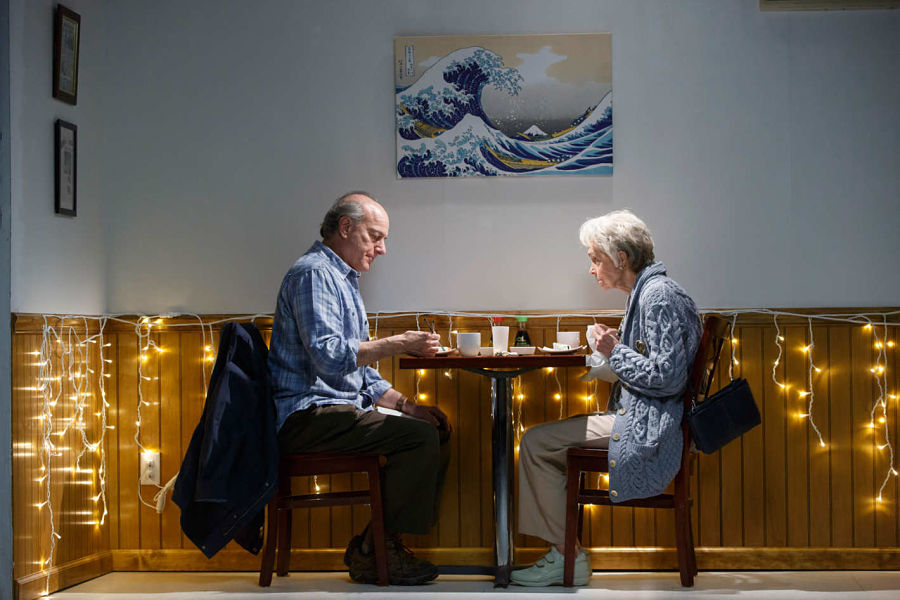Max Posner’s play The Treasurer (the full script of which is published in the April print issue of American Theatre) follows the final throes of a relationship between a son and his aging mother, Ida, whose sense of purpose and mental faculties both decline after the death of her second husband—a man for whom she’d left her first husband when their son was just 13. In a series of transactions and negotiations, Ida and her son both struggle to connect across two lifetimes of guilt and silence. David Cromer directed the play’s world premiere at New York City’s Playwrights Horizons in September 2017.

DAVID CROMER: I loved working on this play.
MAX POSNER: Everyone brought their own family into it. The detail, the pain, the contradictions. The play is about my father and my grandmother. For a long time I treated it as a private document—I was not interested in turning them into play people in a diorama. I wanted the realness of both of them to be part of the event, part of its intimacy and its danger.
The first thing I remember when I read it was the bomb the Son drops partway through: “I don’t love my mom.” What a complicated way to write it: not I hate my mother, not I don’t know my mother, not she did something terrible to me. It’s, I don’t love her; I don’t feel this.
So much of the play is about absence. The absence of one’s mother in childhood. The absence of this feeling for her now, this feeling everyone else seems to have for their parent. The absence of one another in their physical lives. I wanted to put this chasm onstage. The Son has edited Ida out.
She eliminated them too.
I was trying to understand this part of my father that was mysterious to me, to define the channel that was closed between him and his mother, but also within him. His relationship to the audience precedes his relationship to Ida, which mainly happens over the phone between Denver and Albany; they’re never in a room together until they’re in the restaurant near the end of the play. This made for a directorial challenge, or should I say opportunity? How do you stage a play where the majority of interactions happen on the telephone?
I liked the challenge of it. You know, there are these rules about things: Everyone has to be in the same room together, they have to have it out. But now, I mean, most of my conversations are virtual. So we had to create the rules. There is a huge difference between the phone conversations and scenes where people are physically together, when Ida is with Ronette at Talbots or the pillow salesman at the bedding store.
At some point it became clear to me that Ida’s in-person encounters almost always happen with total strangers. Those are the most concrete relationships she gets to have. She left her family when her youngest son was 13 to marry the editor of the Albany Times Union, deserting her life as a housewife for a life that was meaningful and exciting to her.

And in her mind she chose the greater good over her children.
Yes, her fight for social progress in Albany with Ron. Something driven by glamor, or by idealism, or a genuine concern for those in need. It’s never one thing. She chose herself, a reasonable thing to choose.
It’s something that my father did: He chose his emotional survival by marrying someone else and moving away, over the plan our family had. And I can’t say I don’t understand that.
Yes.
The play is in play form to a certain extent because the only people the Son can have an actual conversation with is the audience. He can’t discuss it with his wife or his kids or his brothers. It has to be with someone who can’t indict him, you know?
If only the audience could absolve him or indict him, but all they can do is sit. So he indicts himself. I’m curious about not wanting to be forgiven. He would forgive these faults in others, instantly and emphatically. If he met someone in his position he would insist on their goodness. He does this with Guy in the elevator. We do this, don’t we? Everyone else should be going “up,” but not ourselves.
My dad once said to me in a very weary voice, as if this was a truth and he knew it was ugly to say: “Davey, you don’t have to like your family.” Shocking and true. Of course, you still might have a responsibility toward them.
I’m fascinated by some of the semantic discussions this play provoked. People would say, “But he loved his mom. He clearly loved his mom. He paid for her life. He got her into the retirement home that she wanted to go to.” He’s drastically tortured about his non-love, which might be a form of love?
There’s the line where he refers to his destination: a section of in hell reserved for sons who don’t love enough. I’m not trying to sweeten the ending, but it’s an inch toward the idea that it’s not so simple.
And it’s not an objective hell governed by some god. It’s really just a thought that he has at the beginning of the play—a way to organize his own guilt. It becomes the truest way of describing the deeply unpleasant limbo that he’s in: the limbo of his mother still being alive and having to decide if he’s going to muster a cathartic reconnection before she passes, and then the limbo of his mother being dead and not having done that—not having made amends or tied up their relationship in any kind of bow. That is the state he is describing, and it becomes as real as anything else in this play. In fact, realer. The audience knows it’s extreme, but I hope they recognize a tendency we have to place ridiculous templates onto ourselves.

Also there’s this way in which the Son biologically shuts down around Ida, and that’s how family relationships can work—for some reason we don’t quite understand, we are hard-wired to not be our full selves in their presence.
It’s amazing how family can generate rage.
Yes, rage! A great word to think about with this play. There’s so much rage on both sides, but there’s no venue for it. It goes unexpressed. What we discovered, and what Peter [Friedman] so brilliantly did with the Son, is that he remained steady, never exploding. It’s one of the great advantages to having scenes on the phone: Multiple realities exist at once. There are the methodical words she’s hearing from the phone, but there’s also what we the audience are seeing: a man who is twisting himself in knots with grief and frustration.
Having Deanna Dunagan as a template as we worked on the play over the course of a year—did that start to guide you?
I know my father much more than I know my grandmother. My understanding of their relationship was from his perspective for so long. That’s how the play moves: He welcomes us, reluctantly, into himself. But I think there’s this strange point in the middle of the play where we’re suddenly with her in a way we never expected to be.
While writing the play I uncovered love letters between my grandmother and her second husband, the man she left my grandfather for. I realized there was this incredible love story at the center of her life that had been understandably suppressed and discarded by my father. So I was able to go back without judgment and really fall in love with my grandmother. I would read these letters that were incredibly funny, sensitive, and erotic, written by this woman I knew as a grandmother but couldn’t really know as a woman in her time. So I really did feel like I was meeting her for the first time, rooting for her love story.
It’s funny doing plays, because I’ve really spent much more time having conversations about the inner workings of my family with you and with Deanna than I ever did with my own grandmother. I probably know Deanna better, on some level. So I merged the private relationship I was having with my grandmother’s letters and this history with this brilliant, breathing actor.
I was just thinking of one of my favorite exchanges in the play. Ida is talking to Ronette at Talbots and she says, “People forgive people, don’t they?” Out of the blue. Ronette says, “Yes.” So Ida was clearly spending a lot of time on the idea of: Yeah, I get it, but forgive me! She just couldn’t say it to him.
In many plays, the central argument happens between the two people in conflict. In life, though, arguments are refracted, unfolding across a host of strangers and acquaintances. It’s indirect. His argument is made directly to us, hers is made in these bizarre exchanges with total strangers.
Forgiveness is a great theme, because it’s the greatest thing to do and it’s so fucking hard. You have to give up the thing that you live on, which is anger.
He sacrificed his mother in order to be “good” in all other parts of his life. In this play he has to deal with the badness of that, the bad feeling of that. But then when it’s on him to decide if he’s going to talk to her at the Japanese restaurant, he’s been not talking to her for so long that it’s too late. I don’t think that it’s possible for them to, in the course of that one meal, find their way back to some original point of rupture. My hope is that the play provides some kind of comfort or usefulness in realizing that many of us are privately struggling with similar unpleasant, horrible, and normal feelings. There’s a lovely tension in gathering people together in order to conjure these thoughts we have while totally alone.


